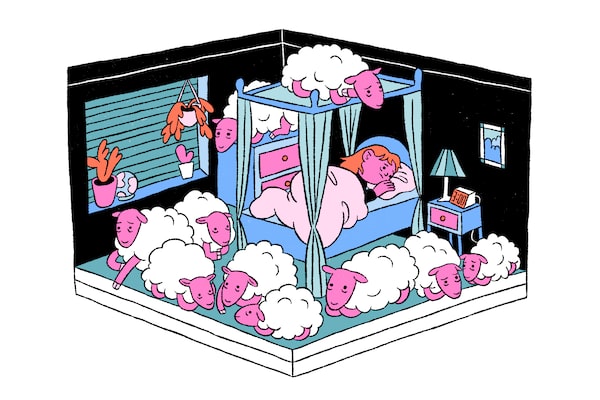
Illustration by Audrey Malo
Even before the pandemic, we were a country of tired, groggy people, with 13 million Canadians not getting the seven to nine hours of shut-eye recommended for adults each night. In late 2019, according to an online poll of 1,000 people by Vancouver-based Research Co., 35 per cent of Canadians were suffering from sleep disorders, including troubles falling asleep, staying asleep and waking far earlier in the morning than they wanted.
Then COVID-19 descended in early 2020 and sleep issues – not just in Canada but around the world – went from being a serious health concern to something verging on a crisis. Not only did we continue to toss and turn at night because of the usual worries (financial and family top the list) but we were also grappling with the terrifying unknowns of a virus that had thrown the planet into disarray.
The cumulative stress, anxiety and upheaval – which gave rise to terms such as “coronasomnia” – played even more havoc with our rest. Remote work gave many people more hours in the day (they no longer had to commute), but it also stretched the workday out with e-mails, texts and Zoom calls occurring later and at less-predictable times. Parents scrambled to help young children with online schoolwork and then stayed up late, or rose earlier in the morning, to catch up on their own work or household chores.
“There was so much stress and anxiety from the pandemic and it changed work/life/sleep balance. The reality is most Canadians have forgotten how to relax in the evening, slow down and unplug,” says Jonathan Charest, who has a PhD in psychology and is director of athlete sleep services at the Centre for Sleep and Human Performance in Calgary. He describes the pandemic as the “perfect storm” of every possible bad thing you can do for your sleep.
Your questions about how to sleep well, answered
Experts from the Royal Ottawa Institute of Mental Health Research estimate that half the population in Canada now struggles with some sort of sleep-related problem. The good news is that governments are finally waking up (pun intended) to the fact that sleep is crucial to leading a healthy life. In June, Canada’s Health Minister Jean-Yves Duclos announced funding of $3.8-million to support research on sleep health and insomnia.
Charles Morin, professor of psychology and Canada Research Chair in Behavioural Sleep Medicine at Laval University’s Brain Research Centre, estimates sleep disorders have increased two- or three-fold in the past couple of years. “I’m speaking here mostly about insomnia, which is the most prevalent of all sleep disorders … but in general we tend to trivialize the consequences of not sleeping well. Most Canadians don’t realize that, even before you reach the threshold of insomnia, lack of sleep can seriously impact your health.”
Morin, who is part of a team behind the research, says he hopes studies funded by the grant will shed some light on why so many of us are poor sleepers, and pave the way for non-pharmacological treatments (such as cognitive behavioural therapy) to help more people. “Sleep is one of the three pillars of good health, along with nutrition and physical activity,” says Morin. “If we don’t sleep well or have trouble sleeping, this impacts our mental and physical health. In return, if we are ill physically or we are stressed, this has an impact on our sleep. It goes both directions.”
The Globe and Mail's exhaustive guide to sleep
Countless studies show lack of sleep does a number on our bodies and our minds. It impairs our immune system and increases the risk of developing heart disease, obesity, high blood pressure, strokes, Type 2 diabetes, cancer and, for people over 50, may even heighten the risk of dementia. It can lead to depression and anxiety, reduces memory and attention span, muddies clear thinking, depletes energy and makes us grumpy. Studies from the University of California, Berkeley and Harvard even suggest that the shorter your sleep, the shorter your life span.
To make matters worse, a sleep-deprived population also takes a toll on the economy. According to the California-based think-tank RAND Corp., the United States leads the world for highest economic losses owing to insufficient sleep – up to US$411-billion a year, or 2.28 per cent of its gross domestic product. However, Canada suffers, too, losing US$21.4-billion annually, which represents 1.35 per cent of GDP.
Sadly, it’s not just adults who are walking around in a sleep-deprived haze. Penny Corkum, a professor in the department of psychology and neuroscience at Dalhousie University in Halifax who specializes in pediatric sleep issues, says children are also suffering from inadequate rest. She estimates 30 to 40 per cent of children and adolescents in Canada are not getting enough sleep and are finding it hard to stay awake during the daytime.
“Bad sleep habits start when you’re young, like all health behaviours, and they will affect you throughout your life,” says Corkum, who is also part of the government research project. “For children, lack of sleep manifests in many ways, none of which are good. In controlled studies, we have taken one hour of sleep away a night and found they respond to things less positively. They are not good at monitoring their academic work. They have more attention problems and difficulties regulating their emotions.”
She agrees that the pandemic has exacerbated the problem – for kids and adults, alike. “All over the world, people are sleeping worse.”
Far too often, Charest says, sleep is the first thing to go by the wayside when people feel pressed for time. “Many people view sleep as a luxury. … We have to educate people better on making sleep a priority in their life. We’ll all be healthier and happier for it.”
 Gayle MacDonald
Gayle MacDonald